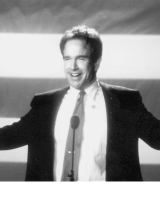IT’S THE SEX, not the politics, that people recall about this bittersweet 1975 bedroom romp, with Warren Beatty as a priapic hairdresser in a Los Angeles garden of earthly delight. “I don’t fuck anybody for money. I do it for fun,” amounts to George’s philosophical credo, since he’s sleeping with every well-heeled client at his salon (but can’t commit to any of them). Produced by its star, Shampoo is set on the verge of Election Day 1968, and 23 years later, Beatty directed Bulworth, set on the verge of California’s primary election day 1996. They serve as bookends to a conservative political era that Beatty clearly despises without being able, or naive enough, to replace with a viable liberal alternative.
SHAMPOO
directed by Hal Ashby with Warren Beatty, Goldie Hawn, Julie Christie, and Jack Warden runs November 24-30 at Grand Illusion
“I don’t think we’re gonna get a winner tonight,” says a TV commentator in Shampoo, eerily paralleling our current electoral stalemate. There, we know Nixon will narrowly prevail, while Beatty obliviously chases after Julie Christie. No less apathetic is businessman Jack Warden, who scoffs of politicians, “What’s the difference? They’re all a bunch of jerks.” Later, playing the suicidal Senator Bulworth, Beatty gives an almost word-for-word paraphrase of that sentiment as he courts death while (equally) offending all his constituents and contributors with hip-hop truth-telling.
Bulworth is George grown up, the success that carefree George half-aspires to be, burdened by the adult compromises of the political system. Before Beatty could bring himself to produce the raggedly vitriolic satire of Bulworth, he had to explore the conditions that created the system, the blissful irresponsibility that allowed Nixon and company to quash flower power and free love. Shampoo is that movie, one of the remarkable films of the ’70s in that it manages to be funny, elegiac, and critical at the same time. In reviewing those lost days, Beatty’s enough of a pessimist to ironically excerpt Nixon’s famous “bring us together” victory speech. Yet he’s also enough of an idealist to ask, as the Beach Boys harmonize on the soundtrack, wouldn’t it be nice?








